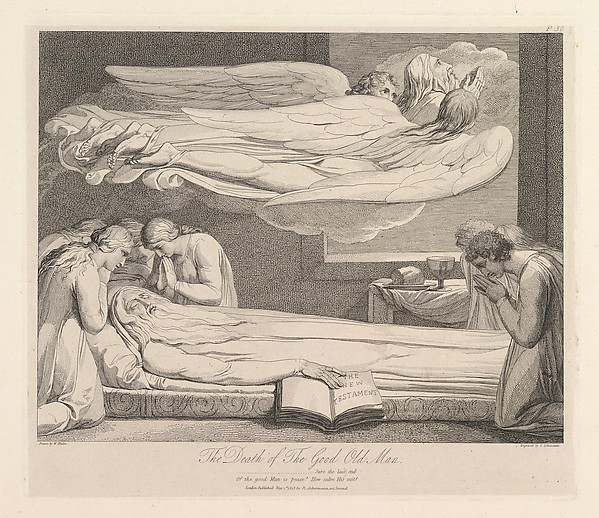 |
| Metropolitan Museum The Death of the Good Old Man from The Grave, a Poem by Robert Blair |
 |
| From Flicker The Death of the Good Old Man Watercolor original |
When Blake created his image of the Resurrection of Christ he had to be recalling his own experience of the ascent of his brother Robert's spirit as it left his body when he died. Blake was attuned to the spiritual world whose outlines were not obscured to his spiritual eye. The image of his beloved brother leaving his body and beginning his journey to the Father would have been indelibly imprinted on William's imagination. Having seen his brother's ascent he could picture the ascent of Jesus in a most convincing and inspiring way.
Peter Ackroyd comments in Blake: A Biography on Blake's continued ability to see visions into his adulthood:
"One early biographer has explained how 'the Scripture overawed his imagination' - to such an extent that he saw it materialising around him. It is not an uncommon gift and one friend, George Richmond, commented in the margin of Gilchrist's Life, 'He said to me that all children saw "Visions" and that the substance of what he added is that all men might see them but for worldliness or unbelief, which blinds the spiritual eye.' " (Page 35)
Blake's first biographer Alexander Gilchrist in The Life of William Blake (1863), writes of the relationship of William and Robert Blake until they were physically but not spiritually parted by Robert's death:
"With Blake and with his wife, at the print shop in Broad Street, Robert for two happy years and a half lived in seldom disturbed accord. Such domestications, however, always bring their own trials, their own demands for mutual self-sacrifice. Of which the following anecdote will supply a hint, as well as testify to much amiable magnanimity on the part of both the younger members of the household. One day, a dispute arose between Robert and Mrs. Blake. She, in the heat of discussion, used words to him, his brother (though a husband too) thought unwarrantable. A silent witness thus far, he could now bear it no longer, but with characteristic impetuosity— when stirred—rose and said to her: "Kneel down and beg Robert's pardon directly, or you never see my face again!" A heavy threat, uttered in tones which, from Blake, unmistakably showed it was meant. She, poor thing! "thought it very hard," as she would afterwards tell, to beg her brother-in-law's pardon when she was not in fault! But being a duteous, devoted wife, though by nature nowise tame or dull of spirit, she did kneel down and meekly murmur, "Robert, I beg your pardon, I am in the wrong." "Young woman, you lie !" abruptly retorted he : "/ am in the wrong!"
At the commencement of
1787, the artist's peaceful happiness was gravely disturbed
by the premature death, in his twenty-fifth year, of this
beloved brother: buried in Bunhill Fields the nth of
February. Blake affectionately tended him in his illness,
and during the last fortnight of it watched continuously day
and night by his bedside, without sleep. When all claim had
ceased with that brother's last breath, his own exhaustion
showed itself in an unbroken sleep of three days' and
nights' duration. The mean room of sickness had been to the
spiritual man, as to him most scenes were, a place of vision
and of revelation ; for Heaven lay about him still, in
manhood, as In Infancy it "lies about us" all. At the last
solemn moment, the visionary eyes beheld the released spirit
ascend heavenward through the matter-of-fact ceiling,
"clapping its hands for joy"—a truly Blake-like detail.
No wonder he could paint such scenes! With him they were work'y-day experiences." (Page 60)
No wonder he could paint such scenes! With him they were work'y-day experiences." (Page 60)
Letters, to Hayley, May 6 1800, (E 705)
"I know that our
deceased friends are more really with us than when they were
apparent to our mortal part. Thirteen years ago. I lost a
brother & with his spirit I converse daily & hourly in the
Spirit. & See him in my remembrance in the regions of my
Imagination. I hear his advice & even now write from his
Dictate--Forgive me for expressing to you my Enthusiasm which I
wish all to partake of Since it is to me a Source of Immortal
Joy even in this world by it I am the companion of Angels. May
you continue to be so more & more & to be more & more perswaded.
that every Mortal loss is an Immortal Gain. The Ruins of Time
builds Mansions in Eternity"
.

No comments:
Post a Comment